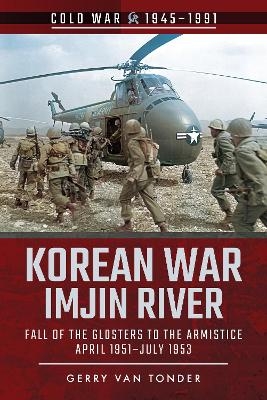
Korean War - Imjin River
Fall of the Glosters to the Armistice, April 1951-July 1953
Seiten
2020
Pen & Sword Military (Verlag)
978-1-5267-7813-0 (ISBN)
Pen & Sword Military (Verlag)
978-1-5267-7813-0 (ISBN)
Nine armies of 27 divisions of the Communist Chinese People's Volunteer Army, numbering 250,000 troops, launch a night attack along a 40-mile front of the US Eighth Army.
As of October 1950, a quarter of a million Communist Chinese troops, in twenty-seven divisions, had poured across the Yalu River into North Korea, with the singular objective of forcing General Douglas MacArthur's United Nations troops back across the 38th Parallel and into the Sea of Japan.
Shortly before midnight on 22 April 1951, to the west of the US Eighth Army's defensive front, the Chinese Sixty-third Army fell on the British 29th Brigade. On the left flank, the 1st Battalion, Gloucester Regiment ( Glosters') held a tenuous position at a ford on the Imjin River. Despite a gallant defence, the battalion was pushed back to make a desperate but futile stand on Hill 235/. On what became known as Glosters' Hill', the battalion ceased to exist. It was subsequently estimated that the attacking force of 27,000 Chinese troops suffered 10,000 casualties, forcing the Chinese army to be withdrawn from the front.
From August 1951 to the summer of 1952, the USAF conducted Operation Strangle in a futile and costly attempt to disrupt Chinese supply routes. In the last two years of fighting, Communist Chinese and UN forces faced each other from well-entrenched positions in hilly terrain, where mapped hill numbers were contested. From June 1952 to March 1953, a series of five hard-fought engagements took place in central Korea as the antagonists sought ownership of Hill 266, commonly referred to as Old Baldy'. This was followed during April-July 1953 by two tactically pointless battles over Pork Chop Hill, in which the UN forces won the first battle and the Chinese the second, with both sides sustaining major casualties. On 27 July 1953, the two belligerents signed an armistice agreement, implementing a ceasefire that stands to this day. De facto, the Korean War has never ended.
As of October 1950, a quarter of a million Communist Chinese troops, in twenty-seven divisions, had poured across the Yalu River into North Korea, with the singular objective of forcing General Douglas MacArthur's United Nations troops back across the 38th Parallel and into the Sea of Japan.
Shortly before midnight on 22 April 1951, to the west of the US Eighth Army's defensive front, the Chinese Sixty-third Army fell on the British 29th Brigade. On the left flank, the 1st Battalion, Gloucester Regiment ( Glosters') held a tenuous position at a ford on the Imjin River. Despite a gallant defence, the battalion was pushed back to make a desperate but futile stand on Hill 235/. On what became known as Glosters' Hill', the battalion ceased to exist. It was subsequently estimated that the attacking force of 27,000 Chinese troops suffered 10,000 casualties, forcing the Chinese army to be withdrawn from the front.
From August 1951 to the summer of 1952, the USAF conducted Operation Strangle in a futile and costly attempt to disrupt Chinese supply routes. In the last two years of fighting, Communist Chinese and UN forces faced each other from well-entrenched positions in hilly terrain, where mapped hill numbers were contested. From June 1952 to March 1953, a series of five hard-fought engagements took place in central Korea as the antagonists sought ownership of Hill 266, commonly referred to as Old Baldy'. This was followed during April-July 1953 by two tactically pointless battles over Pork Chop Hill, in which the UN forces won the first battle and the Chinese the second, with both sides sustaining major casualties. On 27 July 1953, the two belligerents signed an armistice agreement, implementing a ceasefire that stands to this day. De facto, the Korean War has never ended.
Born in Southern Rhodesia, now Zimbabwe, historian and author Gerry van Tonder came to Britain in 1999/. Specializing in military history, Gerry started his writing career with titles about twentieth-century guerrilla and open warfare in southern Africa, including the co-authored definitive _Rhodesia Regiment 1899-1981_. Gerry presented a copy of this title to the regiment's former colonel-in-chief, Her Majesty the Queen. Having written over twenty books, Gerry writes extensively for several Pen & Sword military history series including Cold War 1945-1991', Military Legacy' (focusing on the heritage of British cities), Echoes of the Blitz', and History of Terror'.
| Erscheinungsdatum | 21.08.2020 |
|---|---|
| Reihe/Serie | Cold War, 1945-1991 |
| Zusatzinfo | 24 colour & 75 black and white illustrations |
| Verlagsort | South Yorkshire |
| Sprache | englisch |
| Maße | 156 x 234 mm |
| Themenwelt | Geschichte ► Allgemeine Geschichte ► Zeitgeschichte |
| Geschichte ► Teilgebiete der Geschichte ► Militärgeschichte | |
| ISBN-10 | 1-5267-7813-0 / 1526778130 |
| ISBN-13 | 978-1-5267-7813-0 / 9781526778130 |
| Zustand | Neuware |
| Haben Sie eine Frage zum Produkt? |
Mehr entdecken
aus dem Bereich
aus dem Bereich
Gewalt, Umwelt, Identität, Methode
Buch | Softcover (2024)
Spector Books OHG (Verlag)
36,00 €
wie Freud im Kollektiv verschwand
Buch | Hardcover (2024)
Klett-Cotta (Verlag)
25,00 €


